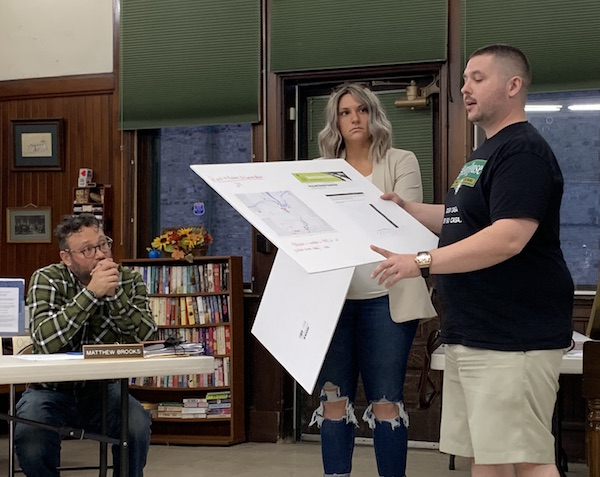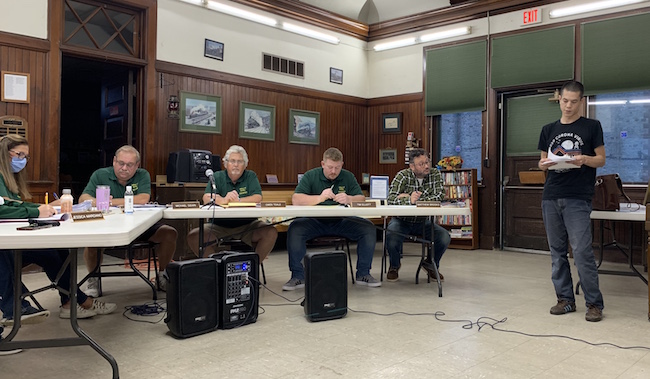Residents urge Medina to ‘opt in’ with marijuana dispensaries

Photos by Tom Rivers: Mitchell Kwandrans, owner of the Hemp House in Medina, presented posters full of information to the Medina Village Board on Monday evening, urging the village to opt in and allow marijuana dispensaries.
MEDINA – The Medina Village Board heard from many community members on Monday evening during a public hearing about whether Medina should opt in or opt out of allowing legal marijuana dispensaries.
Gregory McCarthy, a local resident, was the first speaker during a public hearing and said the dispensaries would allow regulated products to be sold without unknown dangerous products, such as fentanyl.
A local dispensary would also allow close access for people currently going out of town for medical marijuana sites, he said.
Mitchell Kwandrans, owner of the Hemp House in Medina, said his store is popular for CBD oil and other products. He said marijuana could be a big tax revenue generator for the village with Medina getting a 3-percent tax on the dollar.
He estimated that could be $300,000 annually for the village, based on 20 percent of the county’s 40,000 residents spending about $2,500 per year annually on marijuana. That comes out to over $600,000 a year in tax revenue in Kwandran’s projections. He expects Medina would get half with another community the other half.
The state has approved a 13-percent excise tax on marijuana with a breakdown that includes 9 cents for each taxable sale to the state, 3 cents to the municipality that has the dispensary, and 1 cent to the county.
Village Trustee Owen Toale said the figures from Kwandrans were projections that couldn’t be counted on. It is also unknown if there would be increased demand on the Medina Police Department if the dispensaries were allowed, Toale said.
Village Board members said they want more time to study the issue, and see if the state comes through with any regulations for the dispensaries. The state has empowered municipalities to opt in or out, but hasn’t provided details about the dispensaries.
That bothers Village Trustee Marguerite Sherman.
“They are forcing our hand and I’m disappointed in that,” she said about the state.
The state has given municipalities until Dec. 31 to opt in. But if they opt out, they could always opt back in. But if they opt in before Dec. 31, they can’t then opt out.
Mayor Mike Sidari said he is still reading information about the issue, and isn’t ready to make his own decision. He expects the board will decide possibly next month. By then, there might be regulations from the state.
“I want to opt out until I see what the rules are,” he said. “If it’s something we can live with, I’ll opt in.”

Gregory McCarthy tells Village Board members there are many benefits to the dispensaries, including a regulated product with tax revenue for the village. He said many residents would benefit from having the product legally available for anxiety, pain management and other medicinal purposes.
Residents still urged the board to move forward with opting in, saying the state regulations will be similar to the many other states that have already allowed dispensaries.
Tim Zeiner said Medina could use the revenue to help push down a very high tax burden on local property owners.
Bryan DeGraw said marijuana has long not been regulated. The state regulations will be forthcoming. He said the village needs the revenue, even if that total can’t be predicted for certain.
Several others spoke in favor of the dispensaries, saying it would be a safer product and would help people with pain management and other issues.
Kwandrans, owner of the Hemp House, said there are 24 locations in Medina where alcohol can be legally purchased. He said alcohol is far more dangerous than marijuana, with a large role in criminal activity, violence and car accidents.
Kathy Bogan, an attorney with an office on Main Street, said she is concerned about the impact a dispensary could have on the downtown, which boasts numerous small, family-owned businesses. But the lack of fine print from the state is a major concern, she said.
“There are many why I’m against this, but the biggest reason is there are no state regulations for this,” she said during the hearing.
If Medina decides to opt out, village residents could petition the village to put the issue to a vote in a public referendum. They would need to turn in a petition by at least 10 percent of qualified voters within 45 days of the Village Board’s decision to force a public vote.













































































